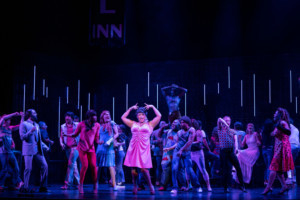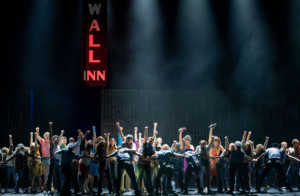Review: No Stonewalling the Message of the Bell-Campbell STONEWALL at City Opera Premiere

If there's nothing colder than yesterday's news, the Stonewall riots--that cornerstone of the gay rights movement, 50-years-old this month--should be the equivalent of a frozen Margarita. Instead, it's hot as New York in August, in Leonard Foglia's nonstop production of STONEWALL, the new opera by Iain Bell and Mark Campbell.
Passionately and urgently conducted by Carolyn Kuan, it had its world premiere production by New York City Opera at the Jazz at Lincoln Center venue, the Rose Theatre, last Friday.
With so many of the mainstream operas lasting four hours and (much) more, it's hard to imagine a work that you wish were longer. But I found myself thinking just that at the end of STONEWALL, which presented a kaleidoscope of gay life as it existed in 1969--not just about sex but police corruption and Mafia bosses thrown in for good measure, and much more.
The creators have made no secret that the work was pulled together at warp speed but, for the most part, one would never have guessed it. In the course of just nine months, the Bell and Campbell captured the spirit and feeling, the angst and the triumphs of the events that began on June 28, 1969 at the Stonewall Inn on New York's Christopher Street--widely considered the pivotal moment in LGBTQ history--and made it soar.

Riccardo Hernandez's simple and seedy (yet extremely effective) set helped move the story along without a hitch, with help from Ken Billington's lighting and the sound design of Daniel Erdberg and Ursula Kwong-Brown. David C. Woolard's costumes set the right tone..
Filled with verbal snapshots of the LGBTQ spectrum on the first night of the historic Stonewall riots 50 years ago, Campbell libretto did almost too good a job in laying out the groundwork for the characters in the first part of the opera--making us want to know more about many of the protagonists through his smart combination of drama and humor. It was amazing that he could cover so much in the three intermission-less parts of the 70-minute piece, without ever falling back on caricature.
There's no real central character in the piece--the closest, for me, is Maggie, the dyke from Dyckman Street (memorably sung by mezzo Lisa Chavez), who's harassed on the subway, beaten in the bar but survives it all--"I'll go on" Samuel Beckett would have said--and in most works this could have been problematic. Yet here it mirrors the tenor of the proceedings, since the riots were not an organized effort but "merely" the building anger of a roaring crowd that decided it had suffered enough abuse from the powers that be.
Still, there were characters that I wanted to know more about, both their present and their fates when the hellish evening came to an end. There was Carlos, the parochial school teacher richly sung by baritone Brian James Myer, fired for his sexuality, despite his devotion to his students. Sarah, the trans woman (fully realized by the transgender singer, Liz Bouk), bass-baritone Rocky Eugenio Sellers, a drag queen who managed to make a big impression with a minimum of material and soprano Jessica Fishenfeld as Leah, with her soaring soprano.
For the most part, the characters Campbell wrote were matched, stroke for stroke, by the pithy, far-reaching score created by Bell, who is expert at writing for the voice and differentiating one from another. His music went from pastiche of period jukebox songs (including Motown's Darlene Love on tape) to the cacophony of the riots that formed the center of the opera to the exquisite choral music at the end the evening, which seemed somewhat disconnected from the harsher tone of the text.
The varied experiences of the characters, both leading up to the riots and during the melee itself, were a panoply of indignities of every sort. This was particularly true when things hit the fan in Part Two, as the police moved in to harass, harangue and entrap the crowd that was (mostly) just out to have fun. The building unrest inside the bar and in the street was staged with ferocity by Rick Sordelet and Christian Sordelet, after the lighter mood of Richard Stafford's disco choreography.
The only somewhat dismaying aspect of the evening was the audience--largely the typical opera crowd that came out to support it. Where was more of the younger end of the spectrum? As philosopher George Santayana famously said, "Those who do not remember the past are condemned to repeat it"--especially at this time and place in our history, where tyranny seems right round the corner. But then, how many among that younger audience remembers Santayana?
There are two more performances of STONEWALL--which also marks the 75th anniversary of the creation of City Opera--next weekend, on the 27th and 28th at 7:30pm. The 28th marks the Stonewall anniversary and will be hosted by Bob the Drag Queen. For more information, visit the City Opera website, and for tickets call CenterCharge at 212-721-6500 (10am-9pm) or visit the Jazz at Lincoln Center box office at Broadway and 60th in the Time Warner Center (10am-6pm).
Reader Reviews

Videos
